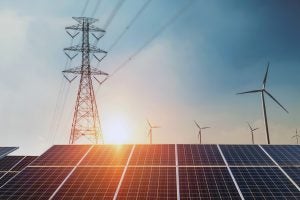Among the announcements expected at the COP28 climate talks in Dubai is a new industry standard for assessing the climate impacts of hydrogen, to be unveiled by the International Standards Organization. These standards could very quickly become the starting point for a cascade of other rules and regulations at national and state levels which set the path for how hydrogen is produced. If done well, we will have a playbook for how hydrogen deployment will help us achieve climate neutrality by 2050. But done poorly, we risk wasting money and increasingly precious time to reduce greenhouse gas emissions.
Energy Exchange
COP28 hydrogen standards: why they matter and what to look for
The twin crises of energy supply and climate have the same solution
 Today’s energy system has become a liability we can no longer afford. As dependence on oil and gas restrains the response to Vladimir Putin’s war on Ukraine, scientists on the Intergovernmental Panel on Climate Change this week issued yet another urgent warning that society is running out of time to avoid dangerous climate change caused by fossil fuel emissions.
Today’s energy system has become a liability we can no longer afford. As dependence on oil and gas restrains the response to Vladimir Putin’s war on Ukraine, scientists on the Intergovernmental Panel on Climate Change this week issued yet another urgent warning that society is running out of time to avoid dangerous climate change caused by fossil fuel emissions.
Politicians and pundits say we must choose which problem to solve — protect the economy or protect the planet. But the twin crises of energy and climate have the same solution: the fastest possible transformation of our global energy system.
To those who want to prioritize the energy crisis, they must contend with the reality that there are no big spigots likely to be opened. Pre-Covid, oil and gas production were near record highs. Recent company announcements offer only marginal bumps in production, not enough to replace Russian oil or change prices at the pump.
And despite their rhetoric, neither producers nor their financiers show any interest in making the massive investments necessary to change these fundamentals.
Clean firm power is the key to affordable, reliable grid decarbonization in California
 California has ambitious efforts underway to decarbonize our electric grid by 2045. The choices we make today will help determine how affordably, equitably and reliably we can get there.
California has ambitious efforts underway to decarbonize our electric grid by 2045. The choices we make today will help determine how affordably, equitably and reliably we can get there.
Renewables are an important piece of the puzzle, but we will also need something else. Renewable energy supplies can drop up to 60% between summer and winter months, due to cloudier skies and less-powerful winds. Short duration storage batteries can complement renewable generation production on a day-to-day basis, but they cannot pull the state through several weeks of reduced supply.
According to a recent study published in the journal Issues in Science and Technology, California will need to increase its renewable energy generation capacity while also tapping into clean firm power resources to meet these goals.
Puerto Rico communities and Energy Bureau chart path to a clean, resilient future
Last month marked a major victory in Puerto Rico’s pursuit of a reliable and sustainable energy system, as the Puerto Rico Energy Bureau issued its resolution on the long-term plans laid out by the Electric Power Authority.
Thanks to the long-standing engagement of local communities and vigorous advocacy from an array of organizations on the island, regulators in San Juan issued an order largely responsive to public calls to accelerate renewables, reject fossil fuels and embrace distributed energy generation via innovative solutions like microgrids and virtual power plants.
The Energy Bureau’s order on the Integrated Resource Plan, which will guide the development of Puerto Rico’s energy resources over the next two decades, puts the archipelago’s energy future on a cleaner, more resilient path with a renewed emphasis on accountability, transparency and customer-centric solutions.
Las comunidades locales y el Negociado de Energía de Puerto Rico trazan la ruta hacia un futuro limpio y resiliente
El mes pasado marcó una gran victoria para el progreso hacia un sistema de energía fiable y sostenible en Puerto Rico, debido a que el Negociado de Energía de Puerto Rico emitió su resolución sobre los planes a largo plazo establecidos por la Autoridad de Energía Eléctrica (PREPA por sus siglas en inglés).
Gracias al compromiso que las comunidades locales han mostrado desde hace tiempo, y a la enérgica defensa de una serie de organizaciones en el archipiélago, los reguladores de San Juan emitieron una orden que responde en gran medida al llamado público para acelerar el uso de energía renovable, rechazar los combustibles fósiles y adoptar la generación de energía distribuida a través de soluciones innovadoras como microrredes y plantas de energía virtual.
VW settlement funds spark string of North Carolina electrification projects
After years of legal and legislative wrangling at state and federal levels, the first round of Volkswagen settlement funds will soon begin to flow to grantees. Thanks to the leadership of Rep. Chuck McGrady (R-Hendersonville), the General Assembly unanimously passed legislation in June to release $31 million to fund the first of a three-phase plan to utilize the state’s settlement allocation. The funds are part of the settlement Volkswagen agreed to after six years of deliberately programming vehicle models to deceive tailpipe inspectors by dramatically under representing their nitrogen oxide emissions — a pollutant linked to respiratory diseases and a key element for the formation of smog and acid rain.
The settlement dictated that allocated dollars only be spent on projects that reduce air pollution. In North Carolina, that first round of funds has been earmarked to replace the state’s oldest transit and school buses with a combination of improved efficiency and zero-emission models. Of the total $31 million, lawmakers also allocated $3.4 million to install electric vehicle charging infrastructure across the state.












